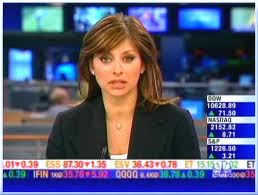-
The Daily Show once again provides a great lesson for financial journalists
The Daily Show’s great success with merging comedy and serious political and business coverage, while reaching a previously unserved audience of younger people who never followed politics, is a great example for financial journalists who want to think out of the box about their profession.

While there are some key characteristics which makes the Daily Show innovative and popular—comedy, irreverence, a fresh perspective, questioning authority, and a measured skepticism—he best example is contained in Stewart’s great treatment of the Davos 2015 conference of the world’s richest corporate exec.
Unlike the financial reporters from CNBC, MSNBC, and CNN who all attended Davos, The Daily Show put it into perspective for the masses, those who have a few thousand in mutual funds, large mortgages, job insecurity and pay their taxes.
While the average view cannot articulate it, they know that the corporatist message passed along by too many on-air financial reporters does not jibe with their own daily reality. The corporate double-talk and emphasis on issues which don’t matter to average Americans, including their own shareholders, is the daily menu on business TV. This situation was the bulls eye for the Daily Show.
What Stewart admonished professional broadcast financial journalists for was their typical, fawning interviews of top CEOs, such as Lloyd Blankfein, Jamie Dimon, Steve Miller, and Larry Fink, who relished in Davos by “celebrating themselves as the richest and most powerful people in the world,” according to Stewart. He was totally correct.
Stewart’s most incisive comment was that the objective journalistic professionalism of those in Davos was sub-par. Steward admonished them by saying that, in effect, the “financial networks introduced these individuals you are covering as journalists as the superstars you would do anything to fuck.”
Toothless Reporting
This would explain the softball questions, chummy repartee, and insipid comments to these global financial titans that went unchallenged. For instance, Steve Miller of AIG said in his interview (as shown in this Daily Show clip) that “we could not do 2008 again if we wanted to.” This comment from the corporation which gets much of the blame for precipitating the 2008 recession went unchallenged by the sleepy reporter conducting the interview.

Did Miller mean that AIG would repeat their risky, unsupervised insurance practices again if they had the chance? We’ll never know because the financial TV reporter interviewing Miller was too busy thinking about the next question or their lunch date to critically listen to his answer and ask a tough follow-up question. This is Journalism 101, but it was not being practiced in Davos.
There are many other great examples of toothless broadcast business journalism. What Stewart and millions of other recognize is that these on-air interviewers act as reporters, but as essentially towing the pro-corporate viewpoint: anti-regulation, anti-government, free-market infallibility, anti-union and the other list of conservatives priorities.
Aside from the recent Davos, pro-corporate example, another interview which comes to mind is Maria Bartiromo’s very sympathetic interview with investor Frank Langone of Home Depot, who has criticized the Pope as being too liberal and anti-capitalist. Langone also played a key role on the NYSE board when he vociferously supported former NYSE CEO Richard’s Grasso’s $180 million secret bonus, the largest in NYSE history.
In the Bartiromo interview with Langone (billed as an “exclusive”), Langone goes off about excessive regulation and not surprisingly, Bartoromo joins in by adding some pro-corporatist slogans herself. She has even challenged Elliot Spitzer about his prosecution of AIG in this interview. Amazingly, others consider her opinion valuable even though she has no industry experience, and a very short industry history.

This interview should also serve as a great example of how some on-air broadcast business reporters are nothing more than shills for some very powerful conservative political lobbying forces.
Since this is the second article on the importance of the Daily Show to financial journalists, I would recommend that any serious financial editor, reporter, journalism teacher or student watch this short clip from Stewart and see how his sense of objectivity, critical thought, and I dare say, justice, is in direct opposition to the lame reporting put out by these high-paid financial reporters who went to Davos, where hotdogs were selling for $50.
If anyone wants to know why income inequality, the lack of real wage growth, retirement insecurity persists, they can blame a lot of on the toothless financial editors and reporters at the nation’s largest outlets who all think they are welcome guests at the inner circle of the richest people in the world.
Nothing could be further from the truth.
As financial journalists who suck up to the top executives, their best reward would be to get a cushy six-figure PR job at their favorite executive’s corporation and even then, they would only be line management, and never part of the real inner circle.










